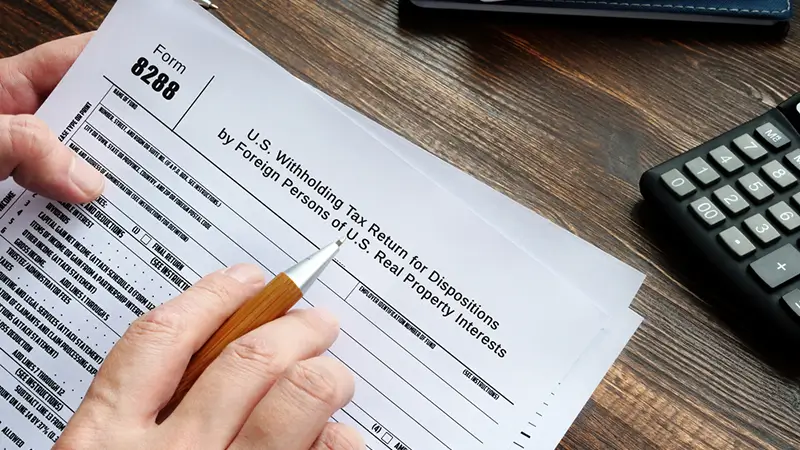U.S Withholding Tax Return for Certain Dispositions by Foreign persons
Form 8288 is the go-to document for reporting and remitting withheld amounts from specific transactions and distributions governed by sections 1445...
6 min read
 H&CO
Jan 13, 2022 12:05:12 PM
H&CO
Jan 13, 2022 12:05:12 PM

The United States is well known for its open economy, which means both locals and foreigners can invest and trade freely. While most investors come from the country, foreigners have been a reliable source of the industry's strength in recent years. The strong demands of the U.S. real estate market are driven by the low-interest rates, and favorable policies, among other factors. If you are a foreigner looking forward to investing in real estate, there are good reasons why the U.S. market is the best for you. However, one main concern about foreign investment is the transfer of money. If you have cash, you probably wonder how you will bring it to the United States and invest safely. This guide explores how to bring money into the United States and the alternative purchase options when you don't have ready cash.
There are two main steps involved in carrying cash from your country to the U.S. the first one is the customs process in your country of origin, and the second is the customs process in the country of destination (United States). Every country has unique rules on how much you should carry when traveling, so you should check and comply. When you clear the customs process of your origin country, you will encounter the customs process of the United States shortly after your arrival.
In the U.S., there's no limit to the amount of money that you can carry when you need to invest. In regards to this regulation, the amount of money includes:
The following monetary instruments do not need customs reporting:
Everyone must complete the U.S. Customs and Border Protection Declaration Form 6059B, regardless of the amount of money. Form 6059B requires you to declare the worth of any U.S. dollars, foreign currency, or financial instruments that you may be carrying along. You can also fill in the worth of silver and gold coins (if you have them). If the total amount of the currency, coins, and silver are equivalent to or more than $10,000, you will complete both forms 6059B and FinCEN 105. FinCEN stands for Finance Crimes Enforcement Network. Immediately after you complete FinCEN 105, the Internal Revenue Service gets a notification to determine if the money is subject to income tax.
Please note that $10,000 is not limited to one person alone. If you are traveling with your family and the total amount carried by the other members exceeds $10,000, you will still need to report customs.
You need the mandatory FinCEN 105 reporting if the worth of your currency and financial instruments surpass $10,000. The form is available on the U.S. Customs and Border Protection agency website, so you can download and fill it out before entering the country. Alternatively, you can fill out the form online using your smartphone or computer and submit it. The form contains basic questions about you, the amount of money you are carrying, and why you are carrying it. If you plan to invest in the U.S. real estate market, you should clearly indicate that information and any other needed details.
Please note that the reporting should be entirely truthful and accurate. The main aim of customs reporting is to track any money from money laundering and other illegal activities. So you don't have to worry. Furthermore, officers are always available at the airport to help you fill the form.
Money reporting in the United States does not have any tax implications, so you don't have to avoid the process.
Here are the possible penalties if you fail to declare your money or financial instruments exceeding $10,000:
Honesty is the key to ensuring you bring in money safely and legally to the United States. Just follow the orders and procedures to save time in reporting, avoid legal issues and invest well.
One good thing about investing in the U.S. real estate market is bringing in money in many forms. Here is a quick review of the top methods to consider when bringing money or capital to the United States.
Cash is the first choice if you don't need to carry a huge amount of money. You can exchange some money in your local bank before you leave and take it with you when traveling to the United States. However, cash is not an ideal option when huge amounts of money are involved because of security concerns. If you prefer to carry large amounts of notes and coins, you should be keen to ensure the money does not get lost in transit or get robbed.
Credit cards are a great option if you don't feel comfortable with large amounts of money with you. After all, credit cards are safer, and you don't have to report them to customs, irrespective of the amount of money you have in the credit line.
You may still need to carry some cash, but getting an international credit card is quite important, especially if you need to improve your credit score and secure a loan for the investment.
Multi-currency travel cards, commonly known as forex cards, are safer and more convenient than credit cards. Forex cards allow you to load different types of currencies before you leave. When you arrive in the U.S., you can withdraw the money from an ATM and use it for your investment purposes.
A multi-currency travel card is the best option for investors with a tight budget. Since the amount is preloaded, your chances of overspending are very low, so you always stick to your budget.
Money orders are safe and convenient for huge amounts of money. Since the money order bears the recipient's name, a money order is hard to steal, and you don't lose any money if it gets lost. When you choose to use a money order, you should write your name as the recipient. After that, you should open an account with a U.S. bank to deposit the money order.
Wire transfer is another excellent option for investors looking forward to transferring large amounts of money. Ideally, a wire transfer is a money transfer between two bank accounts. Before using this option, you should create a new bank account with any bank from the United States. You should also transfer the details of your other account and wait for a maximum of two days for the money to reflect in your U.S. bank account. Wire transfer is an entirely safe method, and you can use it to keep your money safe as you get the ideal property for investment.
Nowadays, many online solutions exist for sending money from one country to another. These online solutions are fast; thus, they are the best when you need to send money and use it within the shortest time possible. Examples of these online payment solutions include PayPal, Google Wallet, Western union, Google Pay, Cash Pay, and many more.
Note: it's advisable to track and keep records of all the money you send using online transfer methods. You should also protect your devices, mainly if you use your phone for transactions, so the details don't fall into the wrong eyes or hands.
It's possible to invest in the U.S real estate market even if you don't have ready cash. However, you should still have a small amount to use as a down payment, especially if you need to secure a loan. Here are your options when you need to invest but have little money.
It's possible to obtain real estate for foreigners in the United States. However, a lot of scrutiny and documentation is done, meaning the process is more complicated than when a U.S resident is applying for the same loan. Most banks forgo foreigners who have never paid U.S tax, reducing the number of bank options for the loans. Few banks that offer foreign loans need proof of an excellent credit score and proof of income. It's hard to take a foreigner who defaults to court, and that's the main reason banks are strict on lending a foreigner.
But there's still hope. You can secure a loan with a U.S bank as a foreigner to make your investment dream a reality. You should, however, consider
The above costs may be slightly higher than those imposed on citizens, and the approval may take longer. But one sure thing is you can get the loan if you meet the requirements.
It's possible to bring money to the United States and participate in the real estate market, even if you are a foreigner. The key is to understand the available financing options and comply with rules when it comes to customs reporting and taxation. If you don't have ready cash, you can apply for a loan and make a down payment of at least 30%.
The U.S real estate market is promising and you can reap great returns when you make the right investments. If you experience any hurdles in investing in real estate as a foreigner, contact us for quick help and guidance.

Form 8288 is the go-to document for reporting and remitting withheld amounts from specific transactions and distributions governed by sections 1445...

The United States–Egypt Income Tax Treaty plays a crucial role in facilitating cross-border business operations and investment by preventing double...

Navigating US tax preparation for Americans who invest internationally, have overseas investments, and US businesses operating internationally can be...